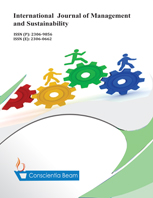Stressors, religiosity, and job performance: The lenses of conservation of resource theory and attachment theory
DOI:
https://doi.org/10.18488/11.v14i1.4044Abstract
This research aims to examine the influence of challenge stressors on job performance and to empirically prove intrinsic and extrinsic religiosity as a moderating variable in the influence of challenge stressors on job performance. Data was collected using a questionnaire survey method. One hundred fifty-three respondents from various organizations in Indonesia participated in this study. Data analysis uses variance-based structural equation modeling. This study successfully proves a new moderator, extrinsic religiosity in the relationship between challenge stressors and job performance. This finding is grounded in attachment theory particularly the anxious attachment style. The study supports the following hypotheses: Challenging stressors improve work performance and external religiosity increases this impact whereas intrinsic religiosity decreases it. The study’s result can help company management to understand the impact of challenge stressors on job performance. In addition, management can also understand the important role of intrinsic and extrinsic religiosity in this relationship.

